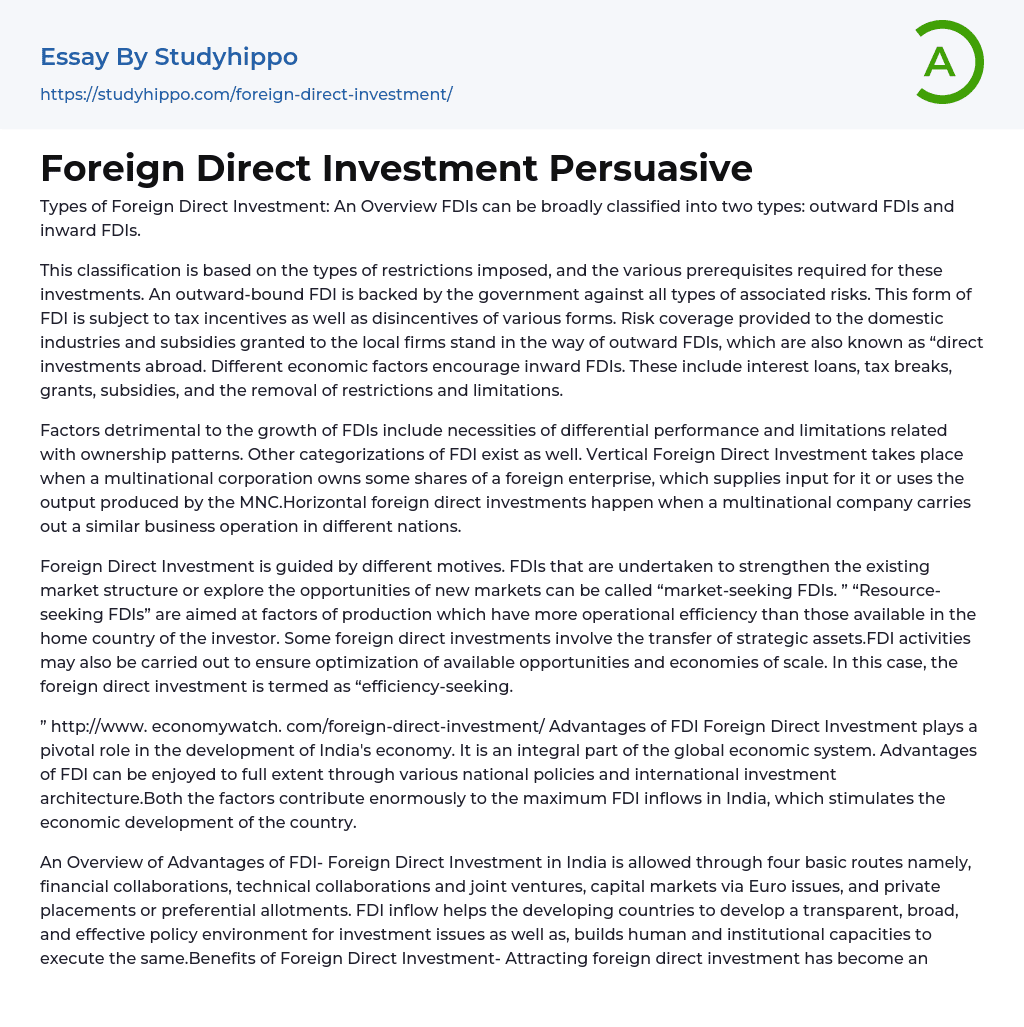FDIs can be categorized into two main types, namely outward FDIs and inward FDIs, which provide an overview of the different types of foreign direct investment.
The categorization of investments is based on the restrictions and prerequisites involved. Outward FDI receives government protection against associated risks and is subject to tax incentives and disincentives. These form of investments are also known as "direct investments abroad" and face obstacles such as risk coverage for domestic industries and subsidies for local firms. Conversely, inward FDIs are encouraged by economic factors including interest loans, tax breaks, grants, subsidies, and the removal of restrictions and limitations.
FDI growth can be hindered by factors such as differential performance requirements and ownership pattern limitations. Other FDI categories include vertical and horizontal investment. Vertical investments involve a multinational corporation owning shares in a foreign enterprise that supplies input or uses output
...produced by the MNC. Horizontal investments occur when a multinational company conducts similar business operations in different countries.
Foreign Direct Investment can be categorized based on its motives. "Market-seeking FDIs" are undertaken to enhance existing market structure or explore new opportunities, while "Resource-seeking FDIs" aim to access factors of production with higher operational efficiency than in the investor's home country. Some FDIs involve the transfer of strategic assets. Another motive for FDI is to optimize available opportunities and achieve economies of scale, referred to as "efficiency-seeking FDIs."
As per Economy Watch, Foreign Direct Investment (FDI) plays a crucial role in India's economic growth and is an integral part of the global economy. FDI benefits India through national policies and international investment architecture, resulting in substantial capital inflows that drive economic development in
the country.
Foreign Direct Investment (FDI) in India can be acquired through financial and technical collaborations, joint ventures, capital markets via Euro issues, and private placements or preferential allotments. The implementation of effective investment policies and enhancing transparency can benefit developing nations from FDI. Additionally, FDI promotes human and institutional capacities which are crucial for economic development. Consequently, attracting FDI is essential for India's growth as it can increase domestic capital inflows, production levels, and employment opportunities.
India's economy has been significantly affected by FDI, creating both positive and negative impacts. Despite accusations of displacing domestic investments and reducing regulatory standards, FDI has facilitated economic development in the country. By implementing effective policies, potential profits from FDI can be maximized for overall growth across various industries. As a result, India's economy has become more prosperous thanks to substantial growth.
The rise of Foreign Direct Investment in India has created new prospects for trading goods and services, including imports and exports. The boost in FDI has resulted in the emergence of many industries capable of producing superior quality products. Furthermore, FDI has enabled the creation of industrial units across multiple regions in India, which generates employment opportunities and enhances skill development. Notably, outsourcing expertise within the Information Technology industry promotes technology diffusion as well as knowledge transfer, thereby contributing to India's technological advancement.
The Indian market is seeing a rise in Foreign Direct Investment (FDI), as an increasing number of foreign companies establish collaborations and joint ventures. This leads to a significant inflow of profits into the Indian economy, due to the large amounts being invested by these foreign firms. However, FDI also has drawbacks such as operational inefficiencies, profit
distribution and personnel management.
Source: http://business.mapsofindia.com/fdi-india/advantages.html
Several countries, such as Ireland, Singapore, Chile and China share the belief that foreign direct investment can have negative impacts on underdeveloped areas of the host country. Therefore, it is crucial for these nations to regulate foreign entities investing in their economy to mitigate adverse effects on environmental, governance and social aspects. Moreover, national secrets that cannot be disclosed to other nations may be compromised through foreign direct investment which poses a threat to a country's defense system.
Investors may encounter challenges when implementing foreign policies and investing directly in a foreign country. These difficulties can include opposition from local workers, high communication and travel expenses, and cultural and language barriers. Additionally, foreign direct investment carries the risk of losing ownership to an overseas company.
Investors may approach foreign direct investment with caution due to instability in certain regions, possibly caused by the size and condition of the host country. Furthermore, lack of strong connections with neighboring developed countries can present obstacles for investors.
While foreign direct investment has been instrumental in molding global economies, governments of host countries may face obstacles when it comes to exerting authority over wholly owned subsidiary firms belonging to foreign investors. This inadequacy could result in significant problems, such as non-adherence by overseas investors with the host country's economic policies and a negative impact on the nation's balance of payments.
The disadvantage of foreign direct investment is explained in detail on the website http://www.economywatch.com/foreign-direct-investment/disadvantages.html.
- Finance essays
- International Business essays
- Macroeconomics essays
- Barriers To Entry essays
- Microeconomics essays
- Pricing essays
- Profit essays
- Consumerism essays
- Export essays
- Free Trade essays
- International Trade essays
- Compensation essays
- Monopoly essays
- Trade essays
- Industry essays
- Warehouse essays
- Economic Development essays
- Economic Growth essays
- Inflation essays
- Taxation essays
- Central Bank essays
- Monetary Policy essays
- Economy essays
- Gross Domestic Product essays
- Recession essays
- Capitalism essays
- Economic System essays
- Materialism essays
- World economy essays
- American Dream essays
- resources essays
- Max Weber essays
- Employment essays
- Minimum Wage essays
- Unemployment essays
- Human Development essays
- Income Inequality essays
- Economic Inequality essays
- Money essays
- Financial Accounting essays
- Market Segmentation essays
- Supply And Demand essays
- Purchasing essays
- Forecasting essays
- Legacy essays
- Bank essays
- Corporate Finance essays
- Financial News essays
- Financial Ratios essays
- Financial Services essays




